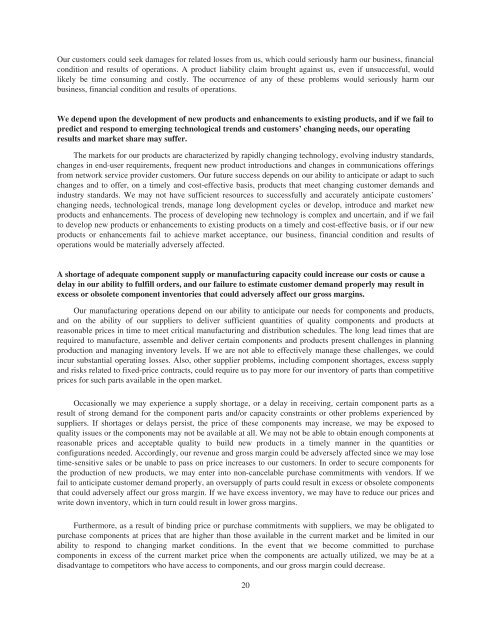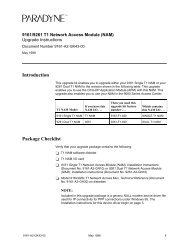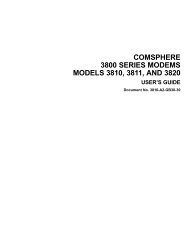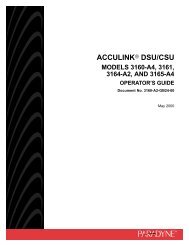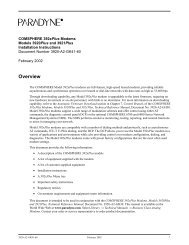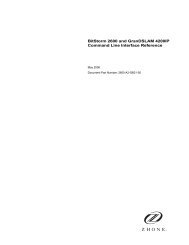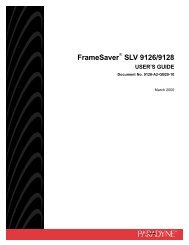Zhone Technologies Annual Report 2004
Zhone Technologies Annual Report 2004
Zhone Technologies Annual Report 2004
You also want an ePaper? Increase the reach of your titles
YUMPU automatically turns print PDFs into web optimized ePapers that Google loves.
Our customers could seek damages for related losses from us, which could seriously harm our business, financial<br />
condition and results of operations. A product liability claim brought against us, even if unsuccessful, would<br />
likely be time consuming and costly. The occurrence of any of these problems would seriously harm our<br />
business, financial condition and results of operations.<br />
We depend upon the development of new products and enhancements to existing products, and if we fail to<br />
predict and respond to emerging technological trends and customers’ changing needs, our operating<br />
results and market share may suffer.<br />
The markets for our products are characterized by rapidly changing technology, evolving industry standards,<br />
changes in end-user requirements, frequent new product introductions and changes in communications offerings<br />
from network service provider customers. Our future success depends on our ability to anticipate or adapt to such<br />
changes and to offer, on a timely and cost-effective basis, products that meet changing customer demands and<br />
industry standards. We may not have sufficient resources to successfully and accurately anticipate customers’<br />
changing needs, technological trends, manage long development cycles or develop, introduce and market new<br />
products and enhancements. The process of developing new technology is complex and uncertain, and if we fail<br />
to develop new products or enhancements to existing products on a timely and cost-effective basis, or if our new<br />
products or enhancements fail to achieve market acceptance, our business, financial condition and results of<br />
operations would be materially adversely affected.<br />
A shortage of adequate component supply or manufacturing capacity could increase our costs or cause a<br />
delay in our ability to fulfill orders, and our failure to estimate customer demand properly may result in<br />
excess or obsolete component inventories that could adversely affect our gross margins.<br />
Our manufacturing operations depend on our ability to anticipate our needs for components and products,<br />
and on the ability of our suppliers to deliver sufficient quantities of quality components and products at<br />
reasonable prices in time to meet critical manufacturing and distribution schedules. The long lead times that are<br />
required to manufacture, assemble and deliver certain components and products present challenges in planning<br />
production and managing inventory levels. If we are not able to effectively manage these challenges, we could<br />
incur substantial operating losses. Also, other supplier problems, including component shortages, excess supply<br />
and risks related to fixed-price contracts, could require us to pay more for our inventory of parts than competitive<br />
prices for such parts available in the open market.<br />
Occasionally we may experience a supply shortage, or a delay in receiving, certain component parts as a<br />
result of strong demand for the component parts and/or capacity constraints or other problems experienced by<br />
suppliers. If shortages or delays persist, the price of these components may increase, we may be exposed to<br />
quality issues or the components may not be available at all. We may not be able to obtain enough components at<br />
reasonable prices and acceptable quality to build new products in a timely manner in the quantities or<br />
configurations needed. Accordingly, our revenue and gross margin could be adversely affected since we may lose<br />
time-sensitive sales or be unable to pass on price increases to our customers. In order to secure components for<br />
the production of new products, we may enter into non-cancelable purchase commitments with vendors. If we<br />
fail to anticipate customer demand properly, an oversupply of parts could result in excess or obsolete components<br />
that could adversely affect our gross margin. If we have excess inventory, we may have to reduce our prices and<br />
write down inventory, which in turn could result in lower gross margins.<br />
Furthermore, as a result of binding price or purchase commitments with suppliers, we may be obligated to<br />
purchase components at prices that are higher than those available in the current market and be limited in our<br />
ability to respond to changing market conditions. In the event that we become committed to purchase<br />
components in excess of the current market price when the components are actually utilized, we may be at a<br />
disadvantage to competitors who have access to components, and our gross margin could decrease.<br />
20


